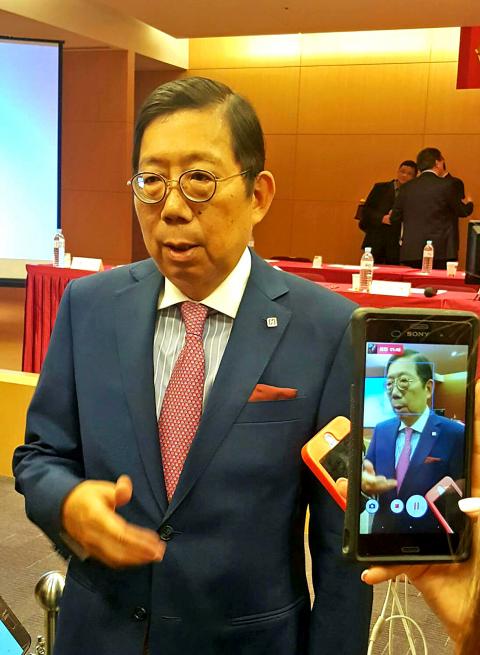Taiwan Mobile Co (台灣大哥大) is studying the possibility of investing in the telecom markets of India and Indonesia, company chairman Richard Tsai (蔡明興) said at the annual general meeting.
Tsai told shareholders that the two markets offer good potential for growth, so the company is evaluating opportunities to invest there.
He said that while India already has many telecom services providers, leading to intense competition and a price war, it has a huge population, creating business opportunities, in particular in data transmission, which is expected to rise.

Photo: CNA
Tsai said that Taiwan Mobile is evaluating the likelihood of teaming up with local telecom operators to win a slice of the 4G market at a time when the Indian market is migrating to 4G technology.
However, any plans about investment in India still needs time to be finalized, he said.
In addition to the expansion in telecom services overseas, Tsai said that Taiwan Mobile has been eying the e-commerce potential in Southeast Asia, adding that Momo.com Inc (富邦媒), its e-commerce subsidiary, has been gearing up to explore the markets in the Philippines and Vietnam.
In particular, Momo.com is seeking a business partner in the Philippines and an agreement on a strategic partnership is expected to be reached by the end of this year, he said.
Taiwan Mobile holds a 51 percent stake in Momo.com, which has been listed on the local main board since December 2014.
In Thailand, Momo.com owns a 35 percent stake in e-commerce operator TVD Shopping.
Tsai said that TVD Shopping has become profitable and is planning to file an application next year to list its shares in Thailand’s stock market.
In Taiwan, Taiwan Mobile is determined to develop its third-party payment business, Tsai said, adding that the company is planning to start an over-the-top (OTT) content business by signing up for good drama series and movies from across the Taiwan Strait.
OTT content can be transmitted through delivery of audio, video and other media over the Internet without the involvement of a multiple-system operator.
Tsai said that Taiwan Mobile has set a target of boosting the number of its 4G subscribers to 5 million next year, up from 3 million at the end of last year, by encouraging existing 2G and 3G subscribers to migrate to 4G.
Shareholders approved a proposal for Taiwan Mobile to distribute NT$5.6 in cash dividends based on last year’s earnings per share of NT$5.76 for a payout ratio of 97 percent.

Nvidia Corp chief executive officer Jensen Huang (黃仁勳) on Monday introduced the company’s latest supercomputer platform, featuring six new chips made by Taiwan Semiconductor Manufacturing Co (TSMC, 台積電), saying that it is now “in full production.” “If Vera Rubin is going to be in time for this year, it must be in production by now, and so, today I can tell you that Vera Rubin is in full production,” Huang said during his keynote speech at CES in Las Vegas. The rollout of six concurrent chips for Vera Rubin — the company’s next-generation artificial intelligence (AI) computing platform — marks a strategic

REVENUE PERFORMANCE: Cloud and network products, and electronic components saw strong increases, while smart consumer electronics and computing products fell Hon Hai Precision Industry Co (鴻海精密) yesterday posted 26.51 percent quarterly growth in revenue for last quarter to NT$2.6 trillion (US$82.44 billion), the strongest on record for the period and above expectations, but the company forecast a slight revenue dip this quarter due to seasonal factors. On an annual basis, revenue last quarter grew 22.07 percent, the company said. Analysts on average estimated about NT$2.4 trillion increase. Hon Hai, which assembles servers for Nvidia Corp and iPhones for Apple Inc, is expanding its capacity in the US, adding artificial intelligence (AI) server production in Wisconsin and Texas, where it operates established campuses. This

US President Donald Trump on Friday blocked US photonics firm HieFo Corp’s US$3 million acquisition of assets in New Jersey-based aerospace and defense specialist Emcore Corp, citing national security and China-related concerns. In an order released by the White House, Trump said HieFo was “controlled by a citizen of the People’s Republic of China” and that its 2024 acquisition of Emcore’s businesses led the US president to believe that it might “take action that threatens to impair the national security of the United States.” The order did not name the person or detail Trump’s concerns. “The Transaction is hereby prohibited,”

Garment maker Makalot Industrial Co (聚陽) yesterday reported lower-than-expected fourth-quarter revenue of NT$7.93 billion (US$251.44 million), down 9.48 percent from NT$8.76 billion a year earlier. On a quarterly basis, revenue fell 10.83 percent from NT$8.89 billion, company data showed. The figure was also lower than market expectations of NT$8.05 billion, according to data compiled by Yuanta Securities Investment and Consulting Co (元大投顧), which had projected NT$8.22 billion. Makalot’s revenue this quarter would likely increase by a mid-teens percentage as the industry is entering its high season, Yuanta said. Overall, Makalot’s revenue last year totaled NT$34.43 billion, down 3.08 percent from its record NT$35.52